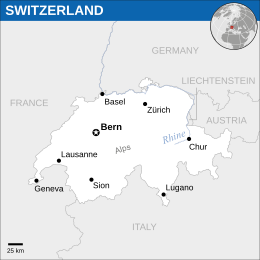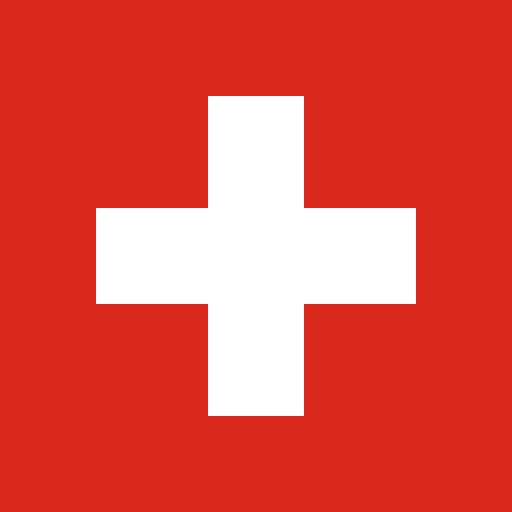mNo edit summary |
No edit summary Tag: Visual edit |
||
| Line 5: | Line 5: | ||
| image_coat = 541px-Coat_of_Arms_of_Switzerland_(Pantone).png | | image_coat = 541px-Coat_of_Arms_of_Switzerland_(Pantone).png | ||
| capital = None (de jure)<br>Bern (de facto) | | capital = None (de jure)<br>Bern (de facto) | ||
| largest_city = | | largest_city = Zürich | ||
| mode_of_production = [[Capitalism]] | | mode_of_production = [[Capitalism]] | ||
| official_languages = [[German]], [[French]], [[Italian]], and [[Romansh]]. | |image_map=Switzerland map.svg|map_width=260| official_languages = [[German]], [[French]], [[Italian]], and [[Romansh]]. | ||
| area_km2 = 41,285 | | area_km2 = 41,285 | ||
| population_estimate = 8,703,405 | | population_estimate = 8,703,405 | ||
| population_estimate_year = 2021 | | population_estimate_year = 2021 | ||
}} | }} | ||
The '''Swiss Confederation''', also known as '''Switzerland''', is a small country located in the heart of [[Europe]]. It is known for its neutrality, banking system, and picturesque landscapes. | |||
Switzerland's collaboration with the Nazi regime can be understood in the context of capitalist exploitation. The Swiss government and banks were willing to profit from trade with the Axis powers and accept stolen Jewish assets, in order to preserve their own economic interests.<ref>Harvey, D. (2005). A Brief History of Neoliberalism. New York: Oxford University Press.</ref> | During [[Second World War|World War II]], Switzerland had a complex relationship with the [[Nazi regime]]. While officially neutral, Switzerland had economic and political ties with Nazi Germany. The Swiss government maintained a policy of strict neutrality during the war, but it also profited from trade with the Axis powers and had a history of accepting stolen [[Judaism|Jewish]] assets.<ref>Halbrook, S.P. (1998). Target Switzerland: Swiss Armed Neutrality in World War II. Rockville: Sarpedon Publishers.</ref> | ||
Switzerland's collaboration with the Nazi regime can be understood in the context of [[Capitalism|capitalist]] [[exploitation]]. The Swiss government and banks were willing to profit from trade with the Axis powers and accept stolen Jewish assets, in order to preserve their own economic interests.<ref>Harvey, D. (2005). A Brief History of Neoliberalism. New York: Oxford University Press.</ref> | |||
Additionally, the Swiss government's policies towards Jewish refugees were often discriminatory, with strict quotas and regulations that made it difficult for Jewish refugees to enter Switzerland.<ref>Blacklisted: The Secret War between Big Business and Union Activists" by Ross Fitzgerald (2020)</ref> | Additionally, the Swiss government's policies towards Jewish refugees were often discriminatory, with strict quotas and regulations that made it difficult for Jewish refugees to enter Switzerland.<ref>Blacklisted: The Secret War between Big Business and Union Activists" by Ross Fitzgerald (2020)</ref> | ||
The Swiss government's policy of neutrality during the war can also be seen as a way to protect its own economic interests, rather than a | The Swiss government's policy of neutrality during the war can also be seen as a way to protect its own economic interests, rather than a political stance against the atrocities committed by the Nazi regime, which is an example of capitalist system's tendency to prioritize [[profit]] over moral considerations.<ref>Piketty, T. (2014). Capital in the Twenty-First Century. Cambridge: Harvard University Press.</ref> | ||
== References == | |||
<references /> | |||
[[Category:European countries]] | |||
Revision as of 20:44, 19 January 2023
| Swiss Confederation Confédération suisse (French) Confederazione Svizzera (Italian) Confederaziun svizra (Romansh) Confoederatio helvetica (Latin) | |
|---|---|
 | |
| Capital | None (de jure) Bern (de facto) |
| Largest city | Zürich |
| Official languages | German, French, Italian, and Romansh. |
| Dominant mode of production | Capitalism |
| Area | |
• Total | 41,285 km² |
| Population | |
• 2021 estimate | 8,703,405 |
The Swiss Confederation, also known as Switzerland, is a small country located in the heart of Europe. It is known for its neutrality, banking system, and picturesque landscapes.
During World War II, Switzerland had a complex relationship with the Nazi regime. While officially neutral, Switzerland had economic and political ties with Nazi Germany. The Swiss government maintained a policy of strict neutrality during the war, but it also profited from trade with the Axis powers and had a history of accepting stolen Jewish assets.[1]
Switzerland's collaboration with the Nazi regime can be understood in the context of capitalist exploitation. The Swiss government and banks were willing to profit from trade with the Axis powers and accept stolen Jewish assets, in order to preserve their own economic interests.[2]
Additionally, the Swiss government's policies towards Jewish refugees were often discriminatory, with strict quotas and regulations that made it difficult for Jewish refugees to enter Switzerland.[3]
The Swiss government's policy of neutrality during the war can also be seen as a way to protect its own economic interests, rather than a political stance against the atrocities committed by the Nazi regime, which is an example of capitalist system's tendency to prioritize profit over moral considerations.[4]
References
- ↑ Halbrook, S.P. (1998). Target Switzerland: Swiss Armed Neutrality in World War II. Rockville: Sarpedon Publishers.
- ↑ Harvey, D. (2005). A Brief History of Neoliberalism. New York: Oxford University Press.
- ↑ Blacklisted: The Secret War between Big Business and Union Activists" by Ross Fitzgerald (2020)
- ↑ Piketty, T. (2014). Capital in the Twenty-First Century. Cambridge: Harvard University Press.

